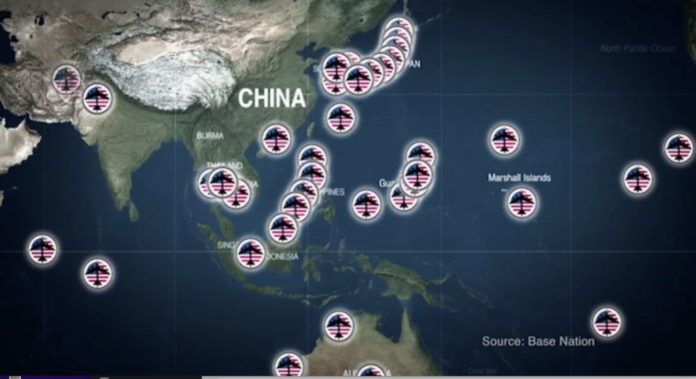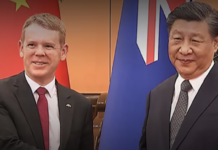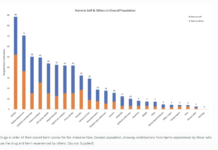NATO Strategic Concept 2022 – NATO’s Pacific plans?
A little reported feature of Pacific politics is NATO’s increasing commitment to supporting collective security in the region. In 2020, Pacific nations Japan, Australia, South Korea and New Zealand were invited to join NATO Foreign Minister’s meetings. The relationship continues to develop with NATO announcing in May 2023 that it would open an office in Tokyo, Japan. A location chosen because it allows for easier liaison with regional defence partners Japan, Australia, South Korea and New Zealand.
A greater Indo-Pacific focus is signalled in NATO’s ‘2022 Strategic Concept’ and in April last year; Japan, Australia, South Korea and New Zealand were invited to the NATO Foreign Ministers conference to discuss the war in Ukraine. Later, in May 2022 the same nation’s Chiefs of Defence Forces were invited to join the NATO Military Committee’s Chiefs of Defence meeting.
China opposes NATO’s activity, in May this year a spokesperson for their foreign ministry saying that “NATO’s continual eastward expansion in the Asia-Pacific, interference in regional affairs, attempts to destroy regional peace and stability, and push for bloc confrontation calls for high vigilance from countries in the region.”
NATO’s ‘Strategic Concepts’ are key planning documents for the alliance that outline NATO’s assessment of the current situation and future aims. The 2022 Strategic Concept is important for the Pacific because for the first time in NATO history it identifies China as a potential threat. The 2022 Strategic Concept discussing the perceived threat stating that “The People’s Republic of China’s (PRC) stated ambitions and coercive policies challenge our interests, security and values.” A clear statement of NATO’s concerns that is elaborated on in the document’s review of NATO’s strategic context.
NATO is a collective security alliance that exists to protect European states from aggression and is committed to the concept of a ‘rules-based order’ or the idea that nation states should use mutually agreed rules of international law to settle disagreements. Russia’s invasion of Ukraine is an example of a powerful country unilaterally deciding to invade another smaller country without regard for international rule of law. A dangerous precedent for any community of nations because if it is tolerated this action empowers other large nations to take what they want from weaker nations.
NATO is interested in China because any conflict in the Pacific or Indian Oceans will impact enormously on maritime trade and therefore on Europe’s economy. Collective security based on international law is a safeguard for maritime trade. NATO’s 2022 Strategic Concept states that “Maritime security is key to our peace and prosperity. We will strengthen our posture and situational awareness to deter and defend against all threats in the maritime domain, uphold freedom of navigation, secure maritime trade routes and protect our main lines of communications.” And; it is not a significant leap of logic to see that NATO’s interest in maritime security could extend into the Pacific and Indian Oceans.
The expansion of NATO interest into the Pacific has significant ramifications. NATO’s military power is extensive and we can already see member nations deploying forces in the region. For instance, the United Kingdom deployed a carrier battle group to the Pacific in 2021 and plans another carrier deployment in 2025. On June 4, 2023 at the Shangri La Dialogue Canadian Defence Minister Anita Anand committed to strengthening Canada’s naval presence in the region. Canada and Italy both supporting United States ‘freedom of navigation’ patrols in the Taiwan Strait. Canadian frigate HMCS Montreal transiting the strait on the same day that Anand spoke in Singapore. France already has a significant presence in the Pacific.
Further, all nations are embracing new definitions of ‘war’ based on ‘multi-domain’ competition. In lay terms, that wars are won not only by combat but by achieving your nations objectives using diverse activities spread across a range of ‘domains’ including cyberwar and information war. Media reports from Nikkei Asia indicate that NATO-Japan discussions include cyber security, countering dis-information campaigns and monitoring emerging technologies. Good examples of the ‘multi-domain’ approach.
In the Pacific, it is likely that we will see increasing pressure on smaller nations to commit to and invest in cyber security functions in order to maintain military and trade relationships with the United States and European nations. This pressure is likely to include funding from the United States and its larger allies however, will be resisted by China and by Russia both of which will offer their own counter deals creating new levels of tension in the region.
Another consideration is how NATO influence subtly changes the political narrative. Instead of competition in the region being bi-polar; or between the United States and China. NATO’s involvement instead provides an international mandate to argue that potential future conflict is about the international rule of law rather than Sino-American competition. A useful distinction when arguing for support from other nations in Africa, South America or the Pacific. So, it seems likely that we will see more NATO diplomatic activity in the region, starting in the north with major economic partners like Japan and South Korea but moving south in time. NATO working with the United States and AUKUS to develop the network of bases and logistics hubs that an alliance needs to militarily compete with China.
Here is a link to NATO’s 2022 Strategic Concept – https://www.nato.int/nato_static_fl2014/assets/pdf/2022/6/pdf/290622-strategic-concept.pdf
Korean Peninsula, US-South Korea exercise, North Korea missile tests.
Last week, the world witnessed more ‘tit for tat’ military diplomacy on the Korean Peninsula. The United States and South Korea recently conducted their largest ever live firing exercises. Starting on 25 May 2023 and finishing recently the exercises involve practicing both army’s soldiers working together firing live ammunition testing their systems and processes.
An interesting focus of this exercise was fighting underground. South Korea has large urban areas so subways, sewers and other subterranean infrastructure provide a safe and speedy way for soldiers to move in urban areas. This focus is also a product of lessons learned in Ukraine, underground your forces are safe from the omnipresent eyes of drones and from long-range precision-guided missiles.
This week the United States also sent a nuclear-powered submarine to South Korea. The submarine, USS Michigan is a cruise-missile armed submarine its role in a potential conflict being to provide accurate long-range attacks on North Korean communications hubs, command centres, air defence systems and other valuable military sites. Carrying 154 Tomahawk cruise-missiles, USS Michigan provides powerful long-range fire support for any operation in Korea.
North Korea responded to these actions with a ballistic missile test, firing missiles near their coast. Reports indicate that it was not very successful and the action was strongly protested by Japan, South Korea and the United States.
On Friday, the Central Committee of the ruling Workers’ Party of Korea opened its latest conference. The nation is struggling under economic pressure created by international sanctions, the impact of COVID 19 and a history of financial mismanagement. Its nuclear and ballistic missile programmes are unsustainable, the country supported by Chinese investment possibly because it provides a useful proxy.
The meeting’s official focus is “the issue of the state diplomatic and defence strategy to cope with the changed international situation” and any discussion of this nature will necessarily be influenced by economic factors. North Korea’s economy is tiny and is getting smaller, so continuing to pursue an advanced weapons programme may soon not be an option. Historically, it is sometimes argued that part of the United States’s Cold War strategy was to force the Soviet Union to compete militarily, an impossible task for the smaller Soviet economy. The resulting economic toll eventually forced Soviet leaders to the bargaining table. Perhaps we are seeing a similar strategy unfold in this case.
Whether the situation around Korea is part of a grand strategy, or deterrence the impact on the Pacific region is the same; the conflict creating another point of tension that needs to be carefully managed.
New Zealand signs defence agreement with Fiji.
On 15 June 2023, New Zealand and Fiji signed a defence agreement designed to improve cooperation between the two nations militaries. The agreement’s statement of intent focuses on three key areas:
- Training and capability development. Including force regeneration post-COVID, both nations military’s capabilities being degraded by having to support their nation’s response.
- Maritime security.
- Working together to respond to natural disasters and humanitarian emergencies.
The defence agreement is also interesting because it reaffirms that the partners view climate change as their greatest security challenge. The document stating that “In responding to these challenges, we are guided by the Boe Declaration on Regional Security, which recognises an expanded concept of security and affirms that climate change remains the single greatest threat to the livelihoods, security and wellbeing of the Pacific.” An interesting contrast with the positions being taken by Australia and the United States.
Finally, the agreement reiterates both nations commitment to the Biketawa Declaration, that provides a tested framework for regional collective security, being used to organise multi-lateral security responses to the Nukualofa riots in 2006, and to fighting in the Solomon Island in 2002. The document stating that “The Ministers reaffirmed the principle that in a time of crisis, a threat to security, or in response to a request for assistance, Pacific Island countries will first seek support from their extended Pacific family and Pacific Islands Forum members to coordinate a regional response.” An important principle, upon which South Pacific security has been based for a long time but that is likely to be challenged in the future; if Sino-American competition increases, and Pacific nations come under pressure to take sides.
Ben Morgan is a bored Gen Xer and TDBs military blogger





The game is up!
Putin, Russia and Zelensky, Ukraine signed a Peace Treaty in 2022!
That’s when the Russian advance on Kyiv stopped!
Then the US and NATO threatened Zelensky!!
https://www.livemint.com/news/world/putin-publicly-shows-draft-of-peace-treaty-signed-by-russia-ukraine-in-2022-watch-11687136116863.html
PS. I think you’re fucked? Checkmate!